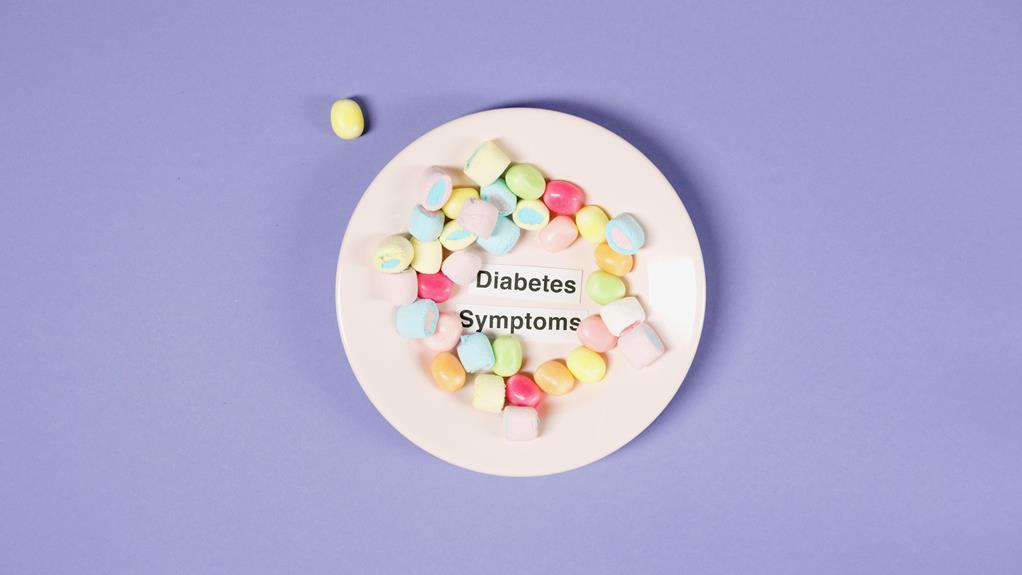How to Manage PCOS Symptoms Through Diet and Exercise

In the realm of managing PCOS symptoms, the theory of utilizing diet and exercise has gained substantial recognition. This approach aims to address the underlying causes of PCOS while alleviating its associated symptoms.
By adopting a professional style of writing, this article will guide you through effective strategies for managing PCOS symptoms through diet and exercise.
With a focus on serving others, we will explore the role of nutrition, exercise, and lifestyle changes in achieving long-term relief from PCOS symptoms.
Key Takeaways
- PCOS symptoms can be effectively managed through a balanced and nutrient-rich diet.
- Including fiber-rich foods and limiting processed and sugary foods can alleviate PCOS symptoms.
- Regular physical activity, including aerobic exercises and strength training, helps regulate menstrual cycles, reduce insulin resistance, and promote weight loss.
- Lifestyle changes, such as a balanced diet and regular exercise, are essential for long-term management of PCOS symptoms.
Understanding PCOS: Causes and Symptoms
Understanding the complex interplay between hormonal imbalances, metabolic dysfunction, and ovarian cysts is crucial in comprehending the causes and symptoms of PCOS.
Polycystic ovary syndrome (PCOS) is a common condition that affects women of reproductive age. The exact cause of PCOS is not fully understood, but it is believed to involve a combination of genetic and environmental factors.
Hormonal imbalances, such as elevated levels of androgens (male hormones) and insulin resistance, play a significant role in the development of PCOS. These imbalances can disrupt the normal functioning of the ovaries, leading to the formation of cysts.
The symptoms of PCOS can vary from person to person but commonly include irregular periods, excess hair growth, acne, and weight gain.
Understanding the causes and symptoms of PCOS is essential for healthcare professionals to provide accurate diagnoses and effective treatment strategies for women with this condition.
The Role of Diet in Managing PCOS Symptoms
Implementing a balanced and nutrient-rich diet can play a significant role in effectively managing PCOS symptoms. When it comes to managing PCOS through diet, it is important to consider the following:
- Include balanced meals: Consuming a variety of nutrient-dense foods like fruits, vegetables, whole grains, lean proteins, and healthy fats can help regulate hormone levels and manage insulin resistance commonly associated with PCOS.
- Be mindful of dietary restrictions: Some individuals with PCOS may have dietary restrictions, such as avoiding gluten or dairy. It is important to identify and accommodate these restrictions to ensure a well-rounded and satisfying diet.
- Focus on fiber-rich foods: Including high-fiber foods like legumes, nuts, and seeds can improve digestion, promote satiety, and regulate blood sugar levels.
- Limit processed and sugary foods: Processed and sugary foods can exacerbate PCOS symptoms, so it is advisable to limit their consumption and opt for healthier alternatives.
Effective Exercise Strategies for PCOS Management
Regular physical activity, including a combination of aerobic exercises and strength training, has been shown to be an effective strategy for managing PCOS symptoms and improving overall health outcomes. Engaging in regular exercise can help regulate menstrual cycles, reduce insulin resistance, lower androgen levels, and promote weight loss, all of which are important for managing PCOS. When designing exercise routines for individuals with PCOS, it is important to focus on a balanced approach that includes both cardiovascular exercises and strength training. Cardiovascular exercises such as walking, swimming, or cycling can help improve heart health and burn calories, while strength training exercises like weightlifting or resistance training can help build lean muscle mass and increase metabolism. Additionally, incorporating flexibility exercises such as yoga or Pilates can help improve overall flexibility and reduce stress levels. To further assist individuals with PCOS in their fitness journey, here are some fitness tips for PCOS:
| Fitness Tips for PCOS |
|---|
| 1. Start Slow and Gradually Increase Intensity |
| 2. Find Activities You Enjoy |
| 3. Stay Consistent |
| 4. Listen to Your Body |
| 5. Seek Professional Guidance |
Nutritional Recommendations for PCOS Patients
Developing a personalized meal plan that emphasizes nutrient-dense foods and supports weight management is crucial for improving metabolic outcomes in PCOS patients. To effectively manage PCOS symptoms through diet, the following strategies can be implemented:
- Identify dietary restrictions: It is important to identify and address any dietary restrictions that may affect nutrient intake and overall health. This may include avoiding certain food groups or ingredients that can exacerbate PCOS symptoms.
- Focus on nutrient-dense foods: Prioritize consuming foods that are rich in vitamins, minerals, and antioxidants. This includes incorporating plenty of fruits, vegetables, whole grains, lean proteins, and healthy fats into the diet.
- Consider supplements: Certain supplements, such as omega-3 fatty acids and vitamin D, have shown potential benefits in managing PCOS symptoms. Consult with a healthcare professional to determine if supplementation is necessary.
- Explore herbal remedies: Some herbs, such as cinnamon and spearmint, have been studied for their potential effects on PCOS symptoms. However, it is important to consult with a healthcare professional before incorporating any herbal remedies into the diet.
Lifestyle Changes for Long-Term PCOS Symptom Management
To achieve long-term management of PCOS symptoms, it is imperative to incorporate lifestyle changes such as adopting a balanced diet and engaging in regular physical activity.
Long-term diet modifications play a crucial role in managing PCOS symptoms, as they can help regulate insulin levels, promote weight loss, and improve hormonal balance. A balanced diet for PCOS should include whole grains, lean proteins, fruits, vegetables, and healthy fats while avoiding processed foods and sugary snacks.
Additionally, regular exercise routines are essential for managing PCOS symptoms. Exercise helps to improve insulin sensitivity, promote weight loss, and reduce stress levels. Incorporating activities like cardio exercises, strength training, and yoga can have a positive impact on PCOS symptoms.
Frequently Asked Questions
Can PCOS Be Cured Through Diet and Exercise Alone, or Is Medication Necessary?
PCOS treatment options include a combination of diet, exercise, and medication. While diet and exercise can help manage symptoms, medication may be necessary to address underlying hormonal imbalances and improve fertility outcomes.
Are There Any Specific Foods That Should Be Completely Avoided in a PCOS Diet?
In managing PCOS symptoms, it is important to consider specific foods to avoid in a PCOS diet. Incorporating lifestyle changes such as proper nutrition can help regulate hormones and improve overall health.
Can Regular Exercise Help Regulate Menstrual Cycles in Women With Pcos?
Regular exercise can have significant benefits for women with PCOS, including helping to regulate menstrual cycles. Research suggests that incorporating exercise into a healthy lifestyle can positively impact hormonal imbalance and improve overall PCOS symptoms.
Is It Necessary to Count Calories or Track Macronutrients in a PCOS Diet?
Counting calories and tracking macronutrients can be beneficial in a PCOS diet, as it helps in maintaining a balanced intake. However, it is not necessary for everyone and individual needs may vary. Consulting a healthcare professional is recommended for personalized guidance.
Are There Any Supplements or Natural Remedies That Can Help Manage PCOS Symptoms?
Supplements for PCOS management and natural remedies for PCOS symptoms can be beneficial in improving overall health and managing specific symptoms. However, it is important to consult with a healthcare professional before starting any new supplements or remedies.









